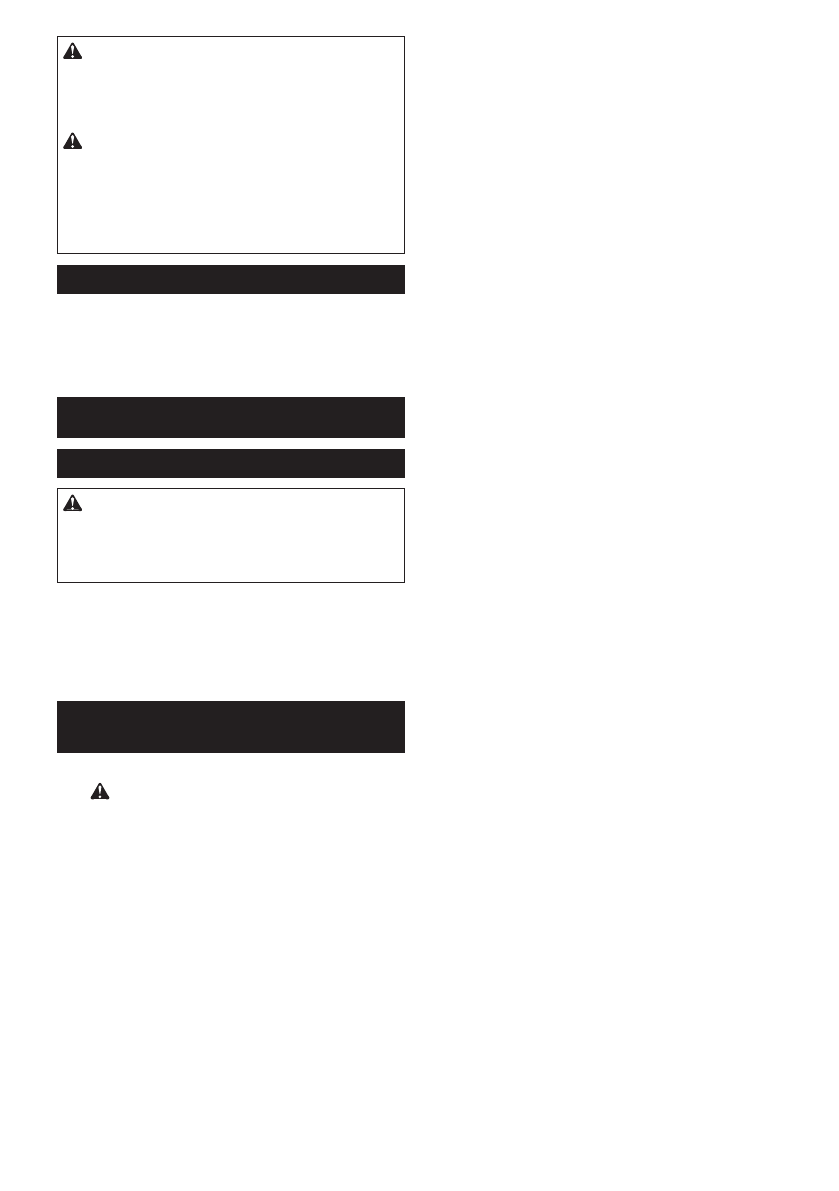Пилы дисковые Makita HS011GZ - инструкция пользователя по применению, эксплуатации и установке на русском языке. Мы надеемся, она поможет вам решить возникшие у вас вопросы при эксплуатации техники.
Если остались вопросы, задайте их в комментариях после инструкции.
"Загружаем инструкцию", означает, что нужно подождать пока файл загрузится и можно будет его читать онлайн. Некоторые инструкции очень большие и время их появления зависит от вашей скорости интернета.

11 ENGLISH
WARNING:
The vibration emission during
actual use of the power tool can differ from the
declared value(s) depending on the ways in which
the tool is used especially what kind of workpiece
is processed.
WARNING:
Be sure to identify safety mea-
sures to protect the operator that are based on an
estimation of exposure in the actual conditions of
use (taking account of all parts of the operating
cycle such as the times when the tool is switched
off and when it is running idle in addition to the
trigger time).
EC Declaration of Conformity
For European countries only
The EC declaration of conformity is included as Annex A
to this instruction manual.
SAFETY WARNINGS
General power tool safety warnings
WARNING:
Read all safety warnings, instruc-
tions, illustrations and specifications provided
with this power tool.
Failure to follow all instructions
listed below may result in electric shock, fire and/or
serious injury.
Save all warnings and instruc-
tions for future reference.
The term "power tool" in the warnings refers to your
mains-operated (corded) power tool or battery-operated
(cordless) power tool.
Cordless circular saw safety
warnings
Cutting procedures
1.
DANGER: Keep hands away from cutting
area and the blade. Keep your second hand
on auxiliary handle, or motor housing.
If both
hands are holding the saw, they cannot be cut by
the blade.
2.
Do not reach underneath the workpiece.
The
guard cannot protect you from the blade below the
workpiece.
3.
Adjust the cutting depth to the thickness of
the workpiece.
Less than a full tooth of the blade
teeth should be visible below the workpiece.
4.
Never hold the workpiece in your hands or
across your leg while cutting. Secure the
workpiece to a stable platform.
It is important to
support the work properly to minimise body expo
-
sure, blade binding, or loss of control.
►
Fig.1
5.
Hold the power tool by insulated gripping
surfaces, when performing an operation where
the cutting tool may contact hidden wiring.
Contact with a “live” wire will also make exposed
metal parts of the power tool “live” and could give
the operator an electric shock.
6.
When ripping, always use a rip fence or
straight edge guide.
This improves the accuracy
of cut and reduces the chance of blade binding.
7.
Always use blades with correct size and shape
(diamond versus round) of arbour holes.
Blades that do not match the mounting hardware
of the saw will run off-centre, causing loss of
control.
8.
Never use damaged or incorrect blade wash-
ers or bolt.
The blade washers and bolt were
specially designed for your saw, for optimum
performance and safety of operation.
Kickback causes and related warnings
— kickback is a sudden reaction to a pinched,
jammed or misaligned saw blade, causing an
uncontrolled saw to lift up and out of the workpiece
toward the operator;
— when the blade is pinched or jammed tightly by the
kerf closing down, the blade stalls and the motor
reaction drives the unit rapidly back toward the
operator;
— if the blade becomes twisted or misaligned in the
cut, the teeth at the back edge of the blade can dig
into the top surface of the wood causing the blade
to climb out of the kerf and jump back toward the
operator.
Kickback is the result of saw misuse and/or incorrect
operating procedures or conditions and can be avoided
by taking proper precautions as given below.
1.
Maintain a firm grip with both hands on the
saw and position your arms to resist kickback
forces. Position your body to either side of the
blade, but not in line with the blade.
Kickback
could cause the saw to jump backwards, but
kickback forces can be controlled by the operator,
if proper precautions are taken.
2.
When blade is binding, or when interrupting a
cut for any reason, release the trigger and hold
the saw motionless in the material until the
blade comes to a complete stop. Never attempt
to remove the saw from the work or pull the
saw backward while the blade is in motion
or kickback may occur.
Investigate and take
corrective actions to eliminate the cause of blade
binding.
3.
When restarting a saw in the workpiece, centre
the saw blade in the kerf so that the saw teeth
are not engaged into the material.
If a saw blade
binds, it may walk up or kickback from the work
-
piece as the saw is restarted.
4.
Support large panels to minimise the risk of
blade pinching and kickback.
Large panels tend
to sag under their own weight. Supports must be
placed under the panel on both sides, near the line
of cut and near the edge of the panel.
►
Fig.2
►
Fig.3
Содержание
- 114 ТЕХНИЧЕСКИЕ ХАРАКТЕРИСТИКИ; Подходящий блок аккумулятора и зарядное устройство; Вибрация
- 115 МЕРЫ БЕЗОПАСНОСТИ; Сохраните брошюру с инструк
- 117 СОХРАНИТЕ ДАННЫЕ; Важные правила техники
- 119 ОПИСАНИЕ РАБОТЫ; Установка или снятие блока
- 120 Защита от перегрева; Действие выключателя
- 121 СБОРКА
- 122 Установка подосновы
- 123 ЭКСПЛУАТАЦИЯ
- 124 Подоснова (направляющая; ФУНКЦИЯ; Что позволяет делать функция
- 125 Регистрация инструмента для
- 126 Описание статуса лампы беспроводной активации
- 127 Поиск и устранение неисправностей для функции беспроводной
- 128 ОБСЛУЖИВАНИЕ; Регулировка точности резки под
- 129 Регулировка направляющей глубины; ДОПОЛНИТЕЛЬНЫЕ
Характеристики
Остались вопросы?Не нашли свой ответ в руководстве или возникли другие проблемы? Задайте свой вопрос в форме ниже с подробным описанием вашей ситуации, чтобы другие люди и специалисты смогли дать на него ответ. Если вы знаете как решить проблему другого человека, пожалуйста, подскажите ему :)

















































































































































